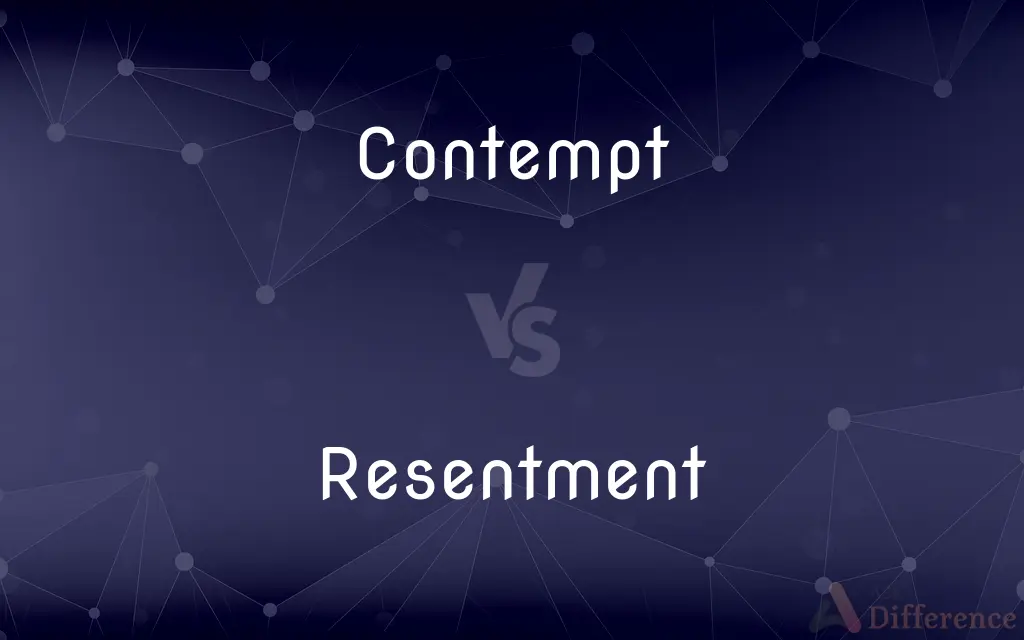Contempt vs. Resentment — What's the Difference?

Difference Between Contempt and Resentment
ADVERTISEMENT
Compare with Definitions
Contempt
Contempt is a pattern of attitudes and behaviour, often towards an individual or group, but sometimes towards an ideology, which has the characteristics of disgust and anger.The word originated in 1393 in Old French contempt, contemps, from the Latin word contemptus meaning "scorn". It is the past participle of contemnere and from con- intensive prefix + temnere "to slight, scorn".
Resentment
Resentment (also called ranklement or bitterness) is a complex, multilayered emotion that has been described as a mixture of disappointment, disgust, anger, and fear. Other psychologists consider it a mood or as a secondary emotion (including cognitive elements) that can be elicited in the face of insult and/or injury.Inherent in resentment is a perception of unfairness (i.e.
Contempt
The feeling that a person or a thing is worthless or beneath consideration
Pam stared at the girl with total contempt
It is no wonder journalists are held in such contempt
Resentment
Indignation or ill will stemming from a feeling of having been wronged or offended.
Contempt
The feeling or attitude of regarding someone or something as inferior, base, or worthless; scorn.
ADVERTISEMENT
Resentment
Anger or displeasure stemming from belief that one has been wronged or betrayed by others; indignation.
Contempt
The state of being despised or dishonored
Was held in contempt by his former friends.
Resentment
(obsolete) The state of holding something in the mind as a subject of contemplation, or of being inclined to reflect upon it; feeling; impression.
Contempt
Open disrespect or willful disobedience of the authority of a court of law or legislative body.
Resentment
(obsolete) satisfaction; gratitude
Contempt
(uncountable) The state or act of contemning; the feeling or attitude of regarding someone or something as inferior, base, or worthless; scorn, disdain.
Resentment
The act of resenting.
Contempt
The state of being despised or dishonored; disgrace.
Resentment
The state of holding something in the mind as a subject of contemplation, or of being inclined to reflect upon something; a state of consciousness; conviction; feeling; impression.
He retains vivid resentments of the more solid morality.
It is a greater wonder that so many of them die, with so little resentment of their danger.
Contempt
(legal) Open disrespect or willful disobedience of the authority of a court of law or legislative body.
Resentment
In a good sense, satisfaction; gratitude.
The Council taking notice of the many good services performed by Mr. John Milton, . . . have thought fit to declare their resentment and good acceptance of the same.
Contempt
The act of contemning or despising; the feeling with which one regards that which is esteemed mean, vile, or worthless; disdain; scorn.
Criminal contempt of public feeling.
Nothing, says Longinus, can be great, the contempt of which is great.
Resentment
In a bad sense, strong displeasure; anger; hostility provoked by a wrong or injury experienced.
Resentment . . . is a deep, reflective displeasure against the conduct of the offender.
Anger is like A full-hot horse, who being allowed his way,Self-mettle tires him.
Can heavently minds such high resentment show,Or exercise their spite in human woe?
Contempt
The state of being despised; disgrace; shame.
Contempt and begarry hangs upon thy back.
Resentment
A feeling of deep and bitter anger and ill-will
Contempt
An act or expression denoting contempt.
Little insults and contempts.
The contempt and anger of his lip.
Contempt
Disobedience of the rules, orders, or process of a court of justice, or of rules or orders of a legislative body; disorderly, contemptuous, or insolent language or behavior in presence of a court, tending to disturb its proceedings, or impair the respect due to its authority.
Contempt
Lack of respect accompanied by a feeling of intense dislike;
He was held in contempt
The despite in which outsiders were held is legendary
Contempt
A manner that is generally disrespectful and contemptuous
Contempt
Open disrespect for a person or thing
Contempt
A willful disobedience to or disrespect for the authority of a court or legislative body
Share Your Discovery

Previous Comparison
Deer vs. Squirrel
Next Comparison
Greyhound vs. Whippet













































